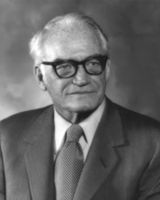What are the essential features of the Republican party? In recent years it seems that if you're not anti-gay or anti-abortion then you must not be Republican. But by the 1980s, the increasing influence of the Christian Right on the Republican Party so conflicted with the kind of Goldwater libertarianism that traditional Republicans became a vocal opponents of the religious right on issues such as abortion and gay rights. Although Goldwater was not as important in the American conservative movement as Ronald Reagan after 1965, from the late 1950s to 1964 he redefined and shaped the movement. McCain summed up Goldwater's legacy thus: he transformed the Republican Party from an Eastern elitist organization to the breeding ground for the election of Ronald Reagan.”,
Goldwater actually viewed abortion as a matter of personal choice, not intended for government intervention--and he ran for President in the 1964 election. But Johnson the welfare statist painted Goldwater as an extremist whose views would plunge Americans into a nuclear war. As a passionate defender of personal liberty, he saw the religious right's views as an encroachment on personal privacy and individual liberties. In his 1980 Senate reelection campaign, Goldwater won support from religious conservatives but in his final term voted consistently to uphold legalized abortion and, in 1981, gave a speech on how he was angry about the bullying of American politicians by religious organizations, and would "fight them every step of the way". He disagreed with the Reagan administration on certain aspects of foreign policy (e.g. he opposed the decision to mine Nicaraguan harbors).
Among all the conservatives running for the 2008 Republican nomination, Ron Paul is by far the most honest and independent. He is the Bary Goldwater of the 2008 election. His views are strongly constitutionalist and libertarian--he would cut taxes immediately, he said that he would slowly get rid of the IRS. Will this be the man to restore the Republic? Nearly two decades ago he actually did run as a Libertarian candidate, but now that he is a "Republican" he has the advantage (from my perspective) of being anti-war and having voted against what he calls "interventionist foreign policy" and the Iraq War authorization in 2002. He also voted against the Patriot Act. This is a list of his political positions in this election.
Sunday, May 20, 2007
Movement in the Republican Party 1980--2008
Submitted by
Acumensch
![]() at
20.5.07
at
20.5.07
Tag Cloud: DNC/RNC 2008
Subscribe to:
Post Comments (Atom)
.png)


No comments:
Post a Comment